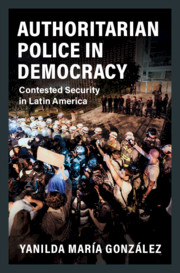Book contents
- Authoritarian Police in Democracy
- Cambridge Studies in Comparative Politics
- Authoritarian Police in Democracy
- Copyright page
- Contents
- Figures
- Tables
- Acknowledgments
- 1 Police
- 2 Ordinary Democratic Politics and the Challenge of Police Reform
- Part I Persistence
- Introduction: The Renewal of Authoritarian Coercion in Democracy
- 3 The Persistence of “the Police that Kills”
- 4 The Endurance of the “Damned Police” of Buenos Aires Province
- 5 Policing in Hard Times
- Part II Reform
- References
- Index
- Other Books in the Series (Continued from page ii)
3 - The Persistence of “the Police that Kills”
Authoritarian Coercion in São Paulo State
from Part I - Persistence
Published online by Cambridge University Press: 30 October 2020
- Authoritarian Police in Democracy
- Cambridge Studies in Comparative Politics
- Authoritarian Police in Democracy
- Copyright page
- Contents
- Figures
- Tables
- Acknowledgments
- 1 Police
- 2 Ordinary Democratic Politics and the Challenge of Police Reform
- Part I Persistence
- Introduction: The Renewal of Authoritarian Coercion in Democracy
- 3 The Persistence of “the Police that Kills”
- 4 The Endurance of the “Damned Police” of Buenos Aires Province
- 5 Policing in Hard Times
- Part II Reform
- References
- Index
- Other Books in the Series (Continued from page ii)
Summary
Chapter 3 probes why São Paulo State’s police have yet to undergo comprehensive structural reform in the decades since Brazil’s democratic transition. Brazil’s transition entailed considerable military reforms in accordance with democratic principles but no comparable effort to reform the country’s police forces. I illustrate how the state’s Military Police leveraged its control over coercion to cultivate structural power vis-à-vis civilian political leaders, through both the selective provision of security in politically beneficial ways and the strategic withdrawal of service. The chapter describes how the Military Police succeeded in constraining policy options available to politicians, and how politicians benefited from accommodating the police. These conditions raised the threshold for police reform in São Paulo over the last three decades, favoring institutional persistence despite the prevalence of widespread extrajudicial killings. I show how the fragmentation of societal preferences over policing and security - rooted in differences in citizens’ experiences with police along lines of race, class, and geography - has yielded little electoral incentive for politicians to enact reform. Instead, a large segment of São Paulo’s citizens demanding weakened legal restrictions on the police’s use of coercion with little external accountability have provided a constituency for politicians favoring authoritarian coercion.
Keywords
- Type
- Chapter
- Information
- Authoritarian Police in DemocracyContested Security in Latin America, pp. 75 - 120Publisher: Cambridge University PressPrint publication year: 2020



